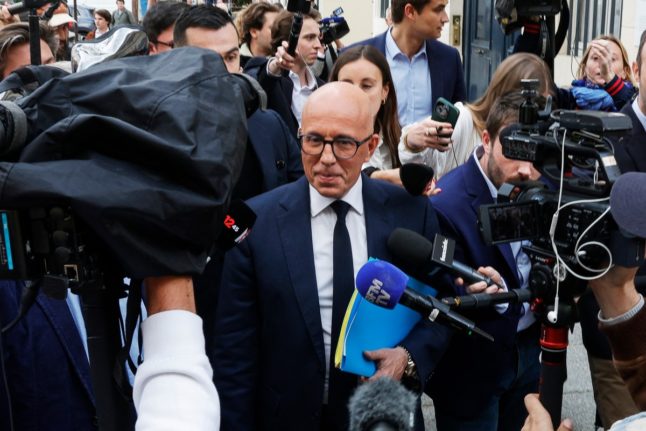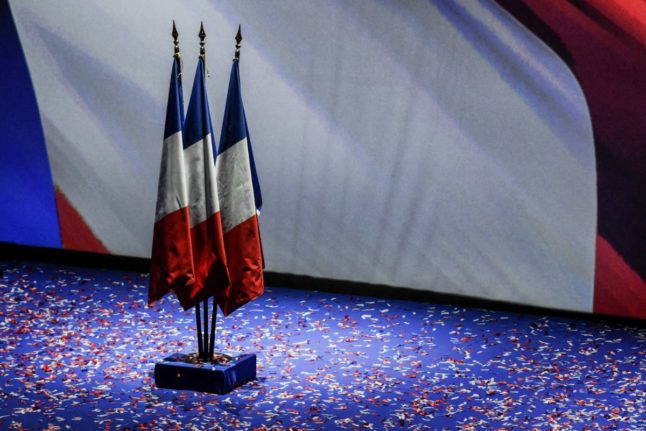The stunning announcement by Les Républicains (LR) leader Eric Ciotti in a television interview is the first time in modern French political history that a leader of a traditional party has backed an alliance with the far-right Rassemblement National (RN).
President Emmanuel Macron called parliamentary elections for June 30, with a second round on July 7 – after the RN scored more than double the number of votes of his centrist alliance in the EU elections.
With less than three weeks to go before the first round, Macron faces opposition alliances crystallising on the left and right and warnings that his bet could backfire.
A Harris Interactive-Toluna poll published on Monday suggested 19 percent of people would back him, compared to 34 percent for the National Rally.
But in an interview, Macron ruled out resigning after the election.
The forthcoming ballot has set alarm bells ringing across Europe, as it risks hobbling France, historically a key player in brokering compromise in Brussels and support for Ukraine against the Russian invasion.
“We need to have an alliance while remaining ourselves… an alliance with the RN and its candidates,” Ciotti told TF1 television, adding that he had already held discussions with Le Pen, a three-time presidential candidate, and RN party leader Jordan Bardella.
Le Pen praised “the courageous choice” and “sense of responsibility” of Ciotti, saying she hoped a significant number of LR figures would follow him.
Bardella told France 2 television that his party would be supporting “dozens” of LR candidates for seats.
The LR party traces its history back to post-war leader Charles de Gaulle and is the political home of ex-presidents such as Jacques Chirac and Nicolas Sarkozy.
Mainstream parties had traditionally shunned the far-right in a strategy known as a ‘sanitary cordon’.
But now “40 years of a pseudo sanitary cordon – which caused many elections to be lost – is disappearing,” Le Pen, now head of RN deputies in the lower house National Assembly, told AFP.
But Ciotti’s move, which he said was aimed at creating a ‘significant’ group in the National Assembly after the elections, risks tearing apart his own party.
The LR speaker of the upper house Senate, Gerard Larcher, said he would ‘never swallow’ an agreement with the RN and called on Ciotti to resign.
Xavier Bertrand, another senior figure in the party who served as a minister during the Sarkozy presidency, called for Ciotti to be excluded from the party.
Accusing him of ‘betrayal’ for having “made the choice of collaboration with the far right”, Bertrand called on party members to vote to determine what they thought of the deal.
Ciotti, speaking to reporters after his interview, said he would not resign and emphasised that his mandate depended on party activists.
Interior Minister Gerald Darmanin, a past defector from the LR to Macron’s alliance, denounced the move as a ‘dishonour to the Gaullist family’ and compared it to the Munich accords with Nazi Germany on the eve of World War Two.
Macron’s office delayed a major press conference initially slated for Tuesday afternoon until Wednesday, in an apparent bid to take stock of the realignment of political forces.
Macron told Figaro Magazine he ruled out resigning, ‘whatever the result’ of snap elections.
“I am only thinking of France. It was the right decision, in the interest of the country,” he said, adding that he was prepared to debate head to head with Le Pen. “I am in it to win,” he said.
Prime Minister Gabriel Attal, was said to be unhappy with the decision to call the election, broke a two-day public silence to tell TF1 television he would lead the campaign for the ruling party.
Former prime minister Edouard Philippe, who leads a party allied to Macron, told BFMTV earlier that it would ‘not be completely healthy’ for the president to lead the campaign.
France’s fractious left-wing parties appeared to set aside differences that had shattered their parliamentary alliance, notably over their conflicting responses to the war in Gaza.
Socialists, Greens, Communists and the hard-left France Unbowed (LFI) said they would “support joint candidates, right from the first round” of the election.



 Please whitelist us to continue reading.
Please whitelist us to continue reading.
Member comments